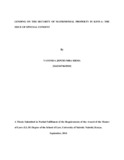| dc.description.abstract | It was only after the passage of the Married Women’s Property Act that women were
even permitted to hold title to real property. These Act, however, only affected a woman’s
right to her separate property, acquired by gifts or by her own efforts and titled in her
name. The Act did not create any property right in assets titled in her husband’s name.
The strict rule against title transfer applied even if the wife was the wage-earner or
worked in the husband’s business. Not surprisingly, under this system the husband, as the
primary wage-earner and title holder, disposed the matrimonial property subject to his
needs, terms and condition. This situation continued for a long time and it largely
contributed to the objectification of women. | en_US |

